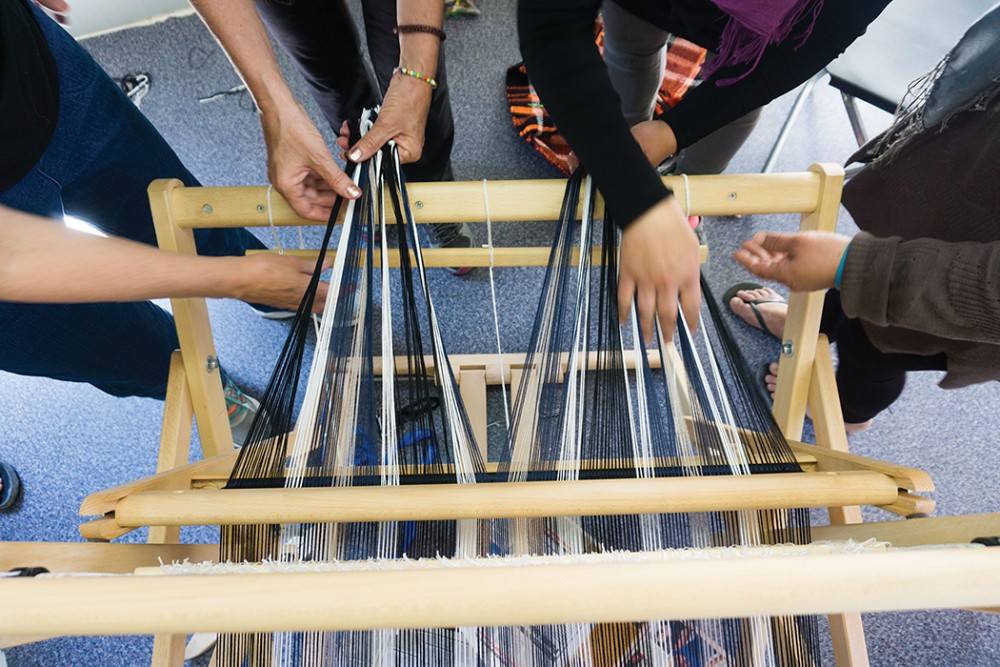Weaving new lives at a refugee camp
A group of women in Nashville found hope through Thistle Farms. Now they're taking a social enterprise project to Greece.

The day the women of the Ritsona refugee camp in Greece wove their first welcome mat, they let out a cheer. Regina Mullins, a woman from Thistle Farms in Nashville, Tennessee, was there to hear it. The mat was a simple thing: a two-foot-by-three-foot floor covering woven from discarded materials, including parts of the life preservers that refugees had worn on their voyages across the Mediterranean. When the first one came off the loom, Mullins said, the women “were jumping and shouting and hollering and crying and laughing.”
But what was one welcome mat in the midst of an international refugee crisis comprising 65 million people? Each of the nine women in the weaving circle had lost everything when they left home, and there were 300 more women in the Ritsona camp alone who lacked economic resources of any kind. In 2016, 80,000 refugees from Syria, Iraq, Pakistan, and other countries requested asylum in Greece. In the fall of 2017, 1,000 refugees a week were arriving on the shores of the Greek islands.
Read our latest issue or browse back issues.
Last year, approximately 10,000 children went missing from refugee camps across Europe. European Union officials believe that they were lured into the sex trade, and this fact suggests the terrible economic and social vulnerability of the women who lived in storage containers turned into living and work space.
Katina Saoulli, who runs an NGO for refugees called I AM YOU, which partnered with Thistle Farms to bring the weaving project to Ritsona, knew that behind the cheers was some skepticism on the part of the weavers and other women in the camp.
“There were women who said, ‘It is too much work; it is not enough money,’” she said. They were tempted to say to other participants, “You are being ridiculous. You are becoming slave labor.” And compared to the obstacles the women would have to overcome to find stability and a viable new life, producing one welcome mat for sale looked like nothing much.
The idea of a refugee-run economic enterprise of weaving mats, using discarded life preservers, blankets, and mountains of donated clothing, was the brain child of Mullins’s colleague, friend, and mentor, Becca Stevens, an Episcopal priest in Nashville. More than 20 years ago, Stevens started the Magdalene project, creating a home for women who were trying to leave the streets, jail cells, and lives of drug addiction and prostitution. It wasn’t long before she recognized that while the women could get clean, get off the drugs, and start over, they could not convince employers to hire them.
Mullins, who was the fifth woman to move into Magdalene House, recalls how the women had been going to the career center, creating resumes, and applying for jobs,. When they discovered that they could not get those jobs, Mullins said, it was “a self-esteem buster.” “We started telling Becca, ‘Nobody is going to give us a chance.’ She believed in us, but nobody else did at that time.”
Mullins remembers the day that Stevens announced the women were going to go into business for themselves and start making candles. As she recalls, Stevens came in one day, and said, “‘You know what we are going to do? We are going to start making candles to support ourselves.’” Mullins says her reaction was as skeptical as the women at the Ritsona refugee camp. “I said, ‘Girl . . . what are you talking about? We don’t know how to make candles.’”
Thistle Farms, the social enterprise wing of Magdalene, now supports more than 40 projects that partner with women to develop self-sustaining businesses in corners of the world where there is little hope and little opportunity. Mullins has seen it happen time and again: women who have lost everything find a way to start over. Getting some help from Thistle Farms, they start to transform their lives and communities. This is Mullins’s own story, and she was seeing it lived out again in Greece.
Stevens dreamed up the idea of making welcome mats while on a hike and thinking about the world’s refugee crisis. “Twenty years from now,” she reflected, “we are going to have so much regret about how we treated refugees . . . that we have treated them like criminals.” She decided that she wanted to develop a social enterprise for refugee women that was “practical, sustainable, and inspirational.” What if they took the life vests that they wore on their harrowing journeys and turned them into welcome mats?
She went home and tried out her idea, using life preservers discarded by a local canoeing outfitter. “Everything I [made] just looked like vacation Bible school arts and crafts,” she said. “I thought, ‘We are going to have to learn to weave them.’”
She organized a group that included a funder, a weaver, Mullins, and Luma Mufleh, an Arabic speaker who works with refugees in Atlanta. Stevens’s colleague Frannie Kieschnick helped Stevens connect with I AM YOU to provide a partner on the ground in Greece. In April 2016 the crew arrived at Ritsona.
Mullins remembers that moment. “Not only could you see the devastation, but you could feel it. It was thick in the air. . . . [Men and women] who had lost everything. No way to take care of their families. . . . They were all in this camp, with these makeshift storage units that they were living in. They were at the mercy of the city to bring them food, water.” But Mullins also had a glimmer of recognition: “When I walked into that camp, I saw what I felt all of those years ago—devastation.”
A lead team had gone ahead and invited a small group of women to participate in the experiment. Looms were set up in a storage container, and the group gathered to learn about the process.
What happened next, says Stevens, is something she has seen happen with women from every background and life experience. “It takes no time for people to start bonding and dreaming and hoping together. It doesn’t take months and years. It takes minutes.”
The group—a mixture of Syrian and Kurdish women—sat together weaving. One woman told of how her ancestors in Syria had been weavers and how, amid the chaos of war, the younger generation had lost the skills. Another woman talked about the camp’s need for a bus. She hoped they could weave enough mats to rent a bus to get children to doctor and dentist appointments in Athens. Another woman talked about hoping to reunite with her family, who had gone ahead to Germany.
“All we had to do to start this process,” Stevens said, “was get some looms and material and sit in a circle.”
As Mullins observed the women at work, she saw them coming back to life—something she had experienced herself. “We brought a way for them to provide for themselves. It was like what I needed to know. I needed to know that I could support myself with or without a man. I needed to know my own self-worth.”
As the organizers became more aware of the complexities of running a social enterprise in a refugee camp, where many different entities determine the rules and regulations, they recognized the many challenges in front of them. Still, the weavers gathered daily, and they developed a mantra: “Just keep weaving.”
“No matter what, just keep weaving,” Stevens repeated. “If there are obstacles because of camp issues, or nonprofit issues, or government issues, or because of psychological issues or trauma, we would say to each other, ‘No matter what, keep weaving.’ As long as we are weaving, we are moving forward.”
Mullins was reminded of her first efforts to make a candle. “We didn’t know anything about that either,” she told the weavers, “but we have Thistle Farms now . . . Y’all come on . . . This is how you start over.”
By spring 2017, there were signs that Mullins was right. A small circle of women had continued weaving, and they have indeed been able to sponsor a bus that goes back and forth to Athens one day a week. The women make all the decisions about that bus—what to charge passengers, when it will run.
“The [women] are working together, they are making money, they are able to have a voice at the community table,” said Saoulli. “By just taking one step after another,” she points out, the women have done a lot: they’ve created 300 or 400 mats; they support a bus to and from Athens; they are able to send money back to their families. Saoulli says that these achievements have led to a “change in mentality.” “They no longer merely wish for things which they imagine are impossible. They look for concrete steps they can take toward realizing what they can imagine.”
Saoulli credits Mullins for bringing this perspective to refugees. Mullins was able to tell the refugee women, “Yes, it looks like I am just making a mat or I am just making a candle, and I am wasting my time. But in the creation of this, I am able to think something different, get out of a loop, and when I get out of that loop, I can make new connections.”
A donor has provided a bigger storage container to serve as the workplace, enabling the women to obtain bigger looms, increase their productivity, and invite more women into the circle. Questions remain, however, about how to get refugee-created products to larger markets. The project still runs into difficulties with camp administration, Greek bureaucracy, and refugee policy.
It isn’t entirely clear what the refugee women are moving forward toward. Only 1 percent of refugees worldwide are ever relocated to a new country. War in their homelands continues. Some analysts point out the limits of small-scale enterprises, saying they fail to address the larger social and economic circumstances that created the refugee crisis in the first place. Stevens understands the critique but still believes that building partnerships and community remains the key to change.
The refugee project “takes thousands and thousands of dollars in investment, a huge time commitment to get all the obstacles and logistics worked out (like shipping, taxes, and international regulations), a deep understanding of the market chain and how to increase the value of the producer, and it takes a willingness to see how the engagement and community helps change all of us who participate,” she acknowledged. But in the end, “I do believe in small groups of women coming together to help change their community.” For Stevens, the goal is “real and radical change that enables [women] to move out of the violence and vulnerability of poverty.”
It will take selling an awful lot of welcome mats to make that happen, Stevens and everyone associated with the project admits. At the same time, it is a simple thing that can be done immediately. Marlei Olsen, who has worked with Thistle Farms for more than a decade, said, “Even though the long-term hope might be great advances politically and culturally for women, small changes, where women have the economic ability to make real choices with their life, are a good place to begin.”
For her part, Mullins was eager to get back to Thistle Farms to share what she had experienced in Greece. “I couldn’t wait to get back here and tell the [women], ‘Hey, we got to hurry up and make these candles because this thing has gone all the way to Greece, and we have touched sisters over there, and we are giving them some hope. That is why we light the candle here in Nashville, Tennessee.’”
A version of this article appears in the January 3 print edition under the title “Weaving new lives.”







